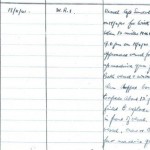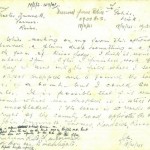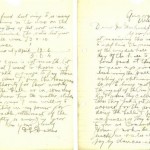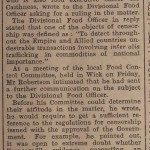Britain had sent some 62,000 Allied troops to reinforce Greece, but they were unable to stop the German invasion. The Greek army which had pushed the Italians into Albania was now cut off; Yugoslavia surrendered on 17 April. Next day, facing certain defeat, Greek Prime Minister Alexander Korizis committed suicide. Meanwhile in Libya Rommel’s Afrika Korps had outstripped its supply lines and was forced to halt; German attacks on Tobruk were repulsed.
 The Receiver of Wrecks noted a dramatic attack (and a lucky escape) at sea in an entry about the SS Lothdale this week in his log: “Vessel left Sunderland unescorted on 17/4/41 for Wick with coal cargo. When 12 miles N.N.W. Fraserburgh at 9.00 pm on 18/4/41 evening aircraft approached vessel from stern & opened up machine gun fire. Vessel replied. Both vessel and aircraft hit. Aircraft then dropped bomb or aerial torpedo about 12 feet from ship. This failed to explode & passed 2 or 3 feet in front of vessel. No injury to vessel, crew or cargo except a few machine gun bullets”
The Receiver of Wrecks noted a dramatic attack (and a lucky escape) at sea in an entry about the SS Lothdale this week in his log: “Vessel left Sunderland unescorted on 17/4/41 for Wick with coal cargo. When 12 miles N.N.W. Fraserburgh at 9.00 pm on 18/4/41 evening aircraft approached vessel from stern & opened up machine gun fire. Vessel replied. Both vessel and aircraft hit. Aircraft then dropped bomb or aerial torpedo about 12 feet from ship. This failed to explode & passed 2 or 3 feet in front of vessel. No injury to vessel, crew or cargo except a few machine gun bullets”
The same day Walter Dunnett, a farmer at Reiss, contacted the Wick Police to report another bomb. “While  working on my farm this afternoon I observed a plane drop something in a field on the farm of Reiss Lodge. I think it would be about 2 pm. After I finished work for the day I went into the field where I saw the object dropped and I found the tail piece of a bomb but I could see no crater. It is possible that if it was a bomb which was dropped it is still there and unexploded.” A note in the margin of the report explains that the incident wasn’t reported, “as the bomb was a British H.E. [high explosive] Bomb”.
working on my farm this afternoon I observed a plane drop something in a field on the farm of Reiss Lodge. I think it would be about 2 pm. After I finished work for the day I went into the field where I saw the object dropped and I found the tail piece of a bomb but I could see no crater. It is possible that if it was a bomb which was dropped it is still there and unexploded.” A note in the margin of the report explains that the incident wasn’t reported, “as the bomb was a British H.E. [high explosive] Bomb”.
 Schools across the county returned after the Easter break, and at once began work on the gardens as part of the Dig for Victory campaign – or at least the boys did. The Head teacher of Stemster School recorded in the log book: “The boys of Pr. 5 and Pr. 3 have begun digging in the garden.”
Schools across the county returned after the Easter break, and at once began work on the gardens as part of the Dig for Victory campaign – or at least the boys did. The Head teacher of Stemster School recorded in the log book: “The boys of Pr. 5 and Pr. 3 have begun digging in the garden.”
The President of the Weydale Hall Committee wrote to Mr McHardy, commander of the Caithness Home Guard,  to complain about the use being made of the hall by the local platoon. “I … gave the key of the hall to some of the home guard at their request over a year ago. Since then they have been using the hall without asking or obtaining authority to do so. To bring matters to a head at the request of the Committee I held back the key & when they called here for it I told them they had to get some authority to answer for the damage they were doing the hall & pay some of the expenses so they told me to apply to you.”
to complain about the use being made of the hall by the local platoon. “I … gave the key of the hall to some of the home guard at their request over a year ago. Since then they have been using the hall without asking or obtaining authority to do so. To bring matters to a head at the request of the Committee I held back the key & when they called here for it I told them they had to get some authority to answer for the damage they were doing the hall & pay some of the expenses so they told me to apply to you.”
 Finally this week, the John O’Groat Journal reported on a controversy involving the powers of the censor. A Caithness man had written to someone outside the county trying to obtain a supply of tea. The letter was read by the official censor, who passed it on to the authorities – as a result the man was prosecuted in Wick Sheriff Court for attempting to break food regulations. Local councillors protested (“Miss L. M. Kennedy, Dunbeath, described this practice as a sort of Gestapo”) and questioned the ethics of the censor also acting as an informer. The Caithness Food Control Committee thought that in future a warning might be more appropriate for a first offence.
Finally this week, the John O’Groat Journal reported on a controversy involving the powers of the censor. A Caithness man had written to someone outside the county trying to obtain a supply of tea. The letter was read by the official censor, who passed it on to the authorities – as a result the man was prosecuted in Wick Sheriff Court for attempting to break food regulations. Local councillors protested (“Miss L. M. Kennedy, Dunbeath, described this practice as a sort of Gestapo”) and questioned the ethics of the censor also acting as an informer. The Caithness Food Control Committee thought that in future a warning might be more appropriate for a first offence.
